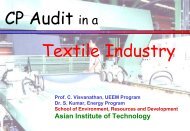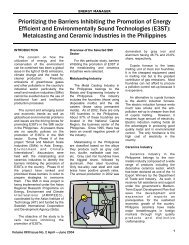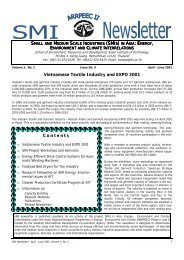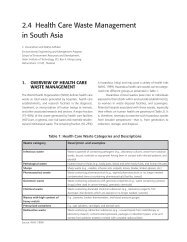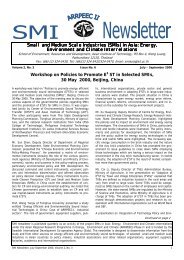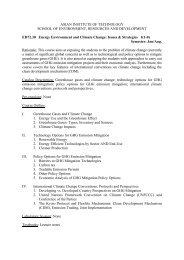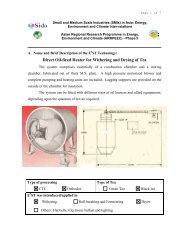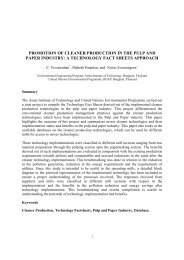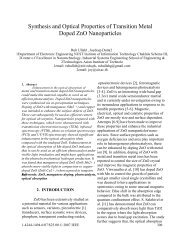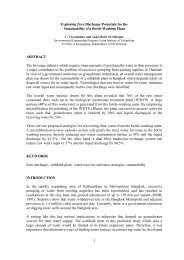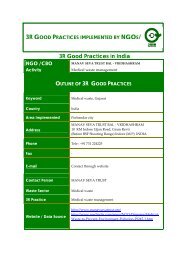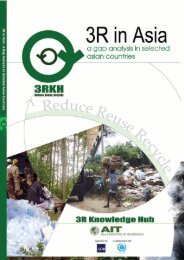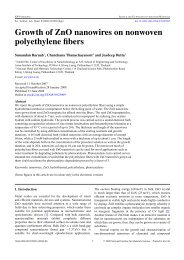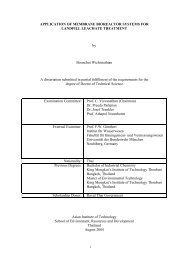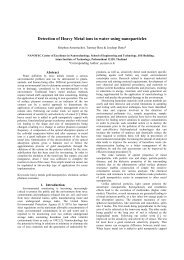Evaluation of Plastic Waste Management in Thailand Using Material ...
Evaluation of Plastic Waste Management in Thailand Using Material ...
Evaluation of Plastic Waste Management in Thailand Using Material ...
You also want an ePaper? Increase the reach of your titles
YUMPU automatically turns print PDFs into web optimized ePapers that Google loves.
2.3.3.2 Re-melted to make products<br />
PET bottles from sorted household wastes are collected, compressed and packed by<br />
municipalities for transportation to plants operated by recycl<strong>in</strong>g bus<strong>in</strong>esses. At the<br />
recycl<strong>in</strong>g plant, the waste is sorted to remove impurities, and the rema<strong>in</strong><strong>in</strong>g PET bottles<br />
then shredded and cleaned, foreign bodies are non-res<strong>in</strong>s are removed and the rema<strong>in</strong>der<br />
turned <strong>in</strong>to flakes and pellets for recycl<strong>in</strong>g. The recycled materials are then sent to textile<br />
and sheet-mak<strong>in</strong>g plants, where they are aga<strong>in</strong> melted down to make <strong>in</strong>to textile and sheet<br />
products (<strong>Plastic</strong> <strong>Waste</strong> <strong>Management</strong> Institute, 2009).<br />
2.3.3.3 Monomerization: PET bottles to PET bottles<br />
The method chemically decomposes the used PET bottles <strong>in</strong>to their component monomers<br />
(de-polymerization), and they are made <strong>in</strong>to new PET bottles from this stage.<br />
2.3.4 Case study <strong>of</strong> plastic waste recycl<strong>in</strong>g<br />
2.3.4.1 <strong>Waste</strong> recycl<strong>in</strong>g <strong>in</strong> <strong>Thailand</strong><br />
Wongpanit Company is an example <strong>of</strong> success <strong>in</strong> recycl<strong>in</strong>g activities with the cooperation<br />
<strong>of</strong> <strong>in</strong>formal sector and public participation. The company buys at least 100 different k<strong>in</strong>ds<br />
<strong>of</strong> wastes, ma<strong>in</strong>ly plastic, paper, metal, and glass bottles. About 20 percent <strong>of</strong> recycled<br />
materials are exported to Ch<strong>in</strong>a, the rest sold on domestic market. The company earns 200<br />
million Baht <strong>in</strong> 1999. The bus<strong>in</strong>ess does not only <strong>in</strong>crease the revenue <strong>of</strong> people, who<br />
participate <strong>in</strong> recycl<strong>in</strong>g activities, it has, at the same time, halved the daily volume <strong>of</strong> waste<br />
collected (Kittikanya, 2001).<br />
The most plastic collected by the Wongpanit Company are Polypropylene (PP),<br />
Polystyrene (PS), Polyethylene (PE), and Polyv<strong>in</strong>ylchloride (PVC). After collection, the<br />
company always sorts plastic wastes <strong>in</strong>to each <strong>of</strong> these four groups. In each group, plastic<br />
wastes are also sorted <strong>in</strong>to different colors such as clear, green, red, white, blue, and black.<br />
Contam<strong>in</strong>ants (e.g. alum<strong>in</strong>um, foils, etc.) must be removed. The plastic is then crushed,<br />
washed, dried, packed and sent to a plastic recycl<strong>in</strong>g plant <strong>in</strong> Samut Prakarn prov<strong>in</strong>ce.<br />
Some types <strong>of</strong> plastic are not recycled <strong>in</strong> <strong>Thailand</strong>, e.g. PVC because the quality <strong>of</strong><br />
recycled PVC is lower than the virg<strong>in</strong> materials. PVC plastic scraps are exported to<br />
Myanmar, where there is a market for the lower quality products. Polyethylene plastic<br />
(PET) from cook<strong>in</strong>g oil and some water bottles are packed with a hydraulic compactor and<br />
exported to Ch<strong>in</strong>a for mak<strong>in</strong>g elastic fibers and textile fibers (Foppes, 2000).<br />
2.3.4.2 <strong>Waste</strong> recycl<strong>in</strong>g <strong>in</strong> Hong Kong<br />
About 1.6 million tons <strong>of</strong> plastic wastes were recovered <strong>in</strong> Hong Kong. The amount<br />
recovered <strong>in</strong> 2010 <strong>in</strong>creased by 366 thousand tons (or 30%) as compared with 2009. The<br />
recovered plastic waste was mostly exported to the Ma<strong>in</strong>land and Vietnam for recycl<strong>in</strong>g<br />
(99.8% or 1.5 million tons).<br />
Most local plastic recyclers consume only clean plastic wastes. The plastic waste recycl<strong>in</strong>g<br />
process starts with the sort<strong>in</strong>g by res<strong>in</strong> types. The plastics are r<strong>in</strong>sed to remove<br />
24



